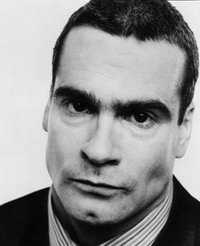This is a letter for an editor of the BBC website for Northamptonshire
Hi, I produce the BBC website for Northamptonshire. In April Henry Rollins will be doing a Q&A session with us. The idea is people will send us thier questions for Henry, I'll pick the best 20 and then put then put them to him. I was wondering if you could mention this on your site and also if you would like to put a question to Henry. The link is: http://www.bbc.co.uk/northamptonshire/interactive/qa/henry_rollins.shtml
The story begins from Black Flag in late 1976 through 1986, vocalist Henry Rollins quickly returned to action following the break-up of Black Flag. He started releasing Hot Animal Machine, followed by the Drive By Shooting EP (under the pseudonym Henrietta Collins And The Wife Beating, Child Haters). The Rollins Band was eventually formed in April of 1987 with Chris Haskett (guitar), Andrew Weiss (bass) and Sim Cain (drums). The group developed their own brand of hard rock with blues and jazz influences, over several studio and live albums, building a considerable following with their heavy touring schedule.
Rollins' lyrics deal with social and political themes, often unashamedly exorcizing personal demons from a troubled childhood. The sight of the heavily muscled and tattooed frontman on stage, dripping sweat and roaring out his rage, is one of the most astonishing, memorable sights in hard rock music, topping off an enthralling live act. Their commercial rise began with the opening slot on the first Lollapalooza tour, exposing the band to huge audiences for the first time. The End Of Silence was a deserved success, and contained some of Rollins' most strikingly introspective lyrics. "Just Like You" narrated his difficulty in dealing with his similarities to an abusive father: "You should see the pain I go through, When I see myself I see you'. Rollins' spoken word and publishing activities (his regime is one that allows for little more than a few hours" sleep each night) also drew major media interest.
An accomplished and experienced spoken word performer with several albums to his credit, Rollins' often hilarious style is in direct contrast to his musical persona, and he has drawn comparisons to Lenny Bruce and Dennis Leary (although, in contrast, he implores his audience not to destroy themselves with poisons like alcohol, sex and tobacco). Despite the humour there is a serious edge to his words, best animated in the harrowing story of the murder of his best friend, Joe Cole, within feet of him. Rollins' workaholic frame also levers his own publishing company, 2.13.61 (after his birthdate), which has grown from small beginnings in 1984 to publish a wide range of authors, including Rollins' own prolific output.
He also has a music publishing enterprise Human Pittbull and co-owns a record label (Infinite Zero) with Rick Rubin dedicated to classic punk reissues - Rollins himself having graduated from the infamous late 70s Washington DC "straight edge" scene and bands such as SOA. He has additionally broken into film acting, appearing in The Chase and Johnny Mnemonic. Back with the Rollins Band, Weight, produced by long-time sound man Theo Van Rock, saw the first personnel change since the band's inception with Melvin Gibbs replacing Weiss, and adding a funkier spine to the band's still intense core. Come In And Burn, released in 1997, was adjudged to be a largely uninspiring collection. Rollins released a further spoken word recording, Think Tank, in 1998 and was also pursuing new acting opportunities, including an appearance in David Lynch's Lost Highway.
